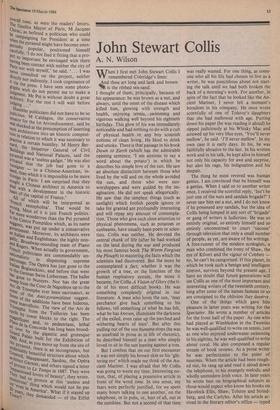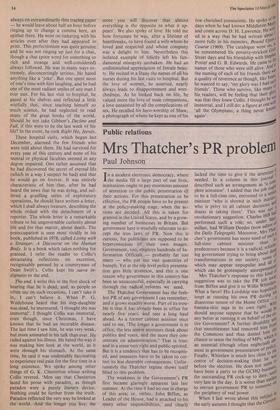John Stewart Collis
When I first met John Stewart Collis I remembered Coleridge's lines: nd thou art long and lank and brown is the ribbed sea-sand.
I thought of them, principally, because of his appearance: he was brown as a nut, and always, until the onset of the disease which killed him, glowing with strength and health, enjoying tennis, swimming and vigorous walking well beyond his eightieth birthday. This glow of his was immediately noticeable and had nothing to do with a cult of physical health or any boy stoutish notions of clean living. He liked to drink and smoke. There is that passage in his book Down to Earth (which has the admirable opening sentence, 'I am anxious to say a word about the potato') in which he describes his simple love of the sun. He saw an absolute distinction between those who lived by the will and on the whole avoided the sun, and those who were sun- worshippers and were guided by the im- agination. He did not speak allegorically. He saw that the simplest things (such as sunlight) which foolish people ignore or take for granted are profoundly interesting and will repay any amount of contempla- tion. Those who give such close attention to physical phenomena, such as potatoes or sunbeams, have usually been poets or scien- tists. Collis was neither. He devoted the central chunk of life (after he had worked on the land during the war and produced his most famous book The Worm Forgives the Plough) to mastering the facts which the scientists had discovered. But the more he contemplated a fact, whether it was the growth of a tree, or the function of the human respiratory system, the more it became, for Collis A Vision of Glory (the ti- tle of his most difficult book). He was something completely original in our literature. A man who loves the sun, 'may perchance give back something to his fellows, tell something of what he has felt, what he has known, illuminate the darkness of the exiled, even raise up the parched and withering hearts of men'. But after this pulling out of the vox humana stops (he was as unafraid in prose as in life of rhetoric), he described himself as a man who simply loved to sit in the sun leaning against a tree.
But I confess that on our first encounter it was not simply his brown skin or his 'glit- tering eye' which made me think of the An- cient Mariner. I was afraid that Mr Collis was going to waste my time. Interesting no- tion, that, of placing a possessive article in front of the word time. In one sense, my fears were perfectly justified, for we spent many hours talking to one another, on the telephone, or in pubs, or, best of all, out in the sunshine. But not a second of that time was really wasted. For one thing, as some- one who all his life had chosen to live as a writer, he was punctilious about not start- ing the talk until we had both broken the back of a morning's work. For another, in spite of the fact that he looked like the An- cient Mariner, I never felt a moment's boredom in his company. He once wrote scornfully of one of Tolstoy's daughters that she had mellowed with age. Putting down his paper (he was reading it aloud) he sipped judiciously at his Whisky Mac and screwed up his very blue eyes. 'You'll never mellow', he said. 'I'll never mellow'. In my own case it is early days. In his, he was faithfully abrasive to the last. In his written work and in his talk, he kept alive in himself not only his capacity for awe and surprise, but also his rage, his indignation and his despair.
The thing he most revered was human genius. I am convinced that he himself was a genius. When I said so to another writer once, I received the scornful reply, 'Isn't he just one of the nuts and sandals brigade?' I never saw him eat a nut, and I do not know if he possessed any sandals, but the idea of Collis being lumped in any sort of 'brigade' or gang of writers is ludicrous. He was so entirely original, so entirely himself and so entirely unconcerned to court 'success' through television that only a small number of people, as yet, are aware of his writings. A fore-runner of the modern ecologists, a man who combined. the irony of Shaw, the eye of Kilvert and the vigour of Cobbett no, he can't be categorised. If this planet, in . which he took such a benign and intelligent interest, survives beyond the present age, I have no doubt that future generations will see Collis as one of the most important and interesting writers of the twentieth century, long after some of the names famous to us are consigned to the oblivion they deserve.
One of the things which gave him pleasure in latter years was writing for the Spectator. He wrote a number of articles for the front half of the paper. As one who had played at Wimbledon in the Twenties he was well-qualified to write on tennis, just as one who enjoyed underwater swimming in his eighties, he was well-qualified to write about coral. He also composed a regular stream of book reviews. As a prose writer he was perfectionist to the point of neurosis. When the article had been rough- ed out, he rang up and read it aloud down the telephone, in his strangely melodic and wholly unmodern Irish voice. In later years he wrote best on biographical subjects as those would expect who know his books on Havelock Ellis, Shaw, Tolstoy and Strind- berg, and the Carlyles. After his article ar- rived in the literary editor's office — typed always on extraordinarily thin tracing paper — he would leave about half an hour before ringing up to change a comma here, an epithet there. He went on tinkering with his articles even after they had appeared in print. This perfectionism was quite genuine and he was not ringing up just for a chat, though a chat (poor word for something so rich and strange and well-considered) always followed. He was in many ways ex- tremely, disconcertingly serious. He hated anything like a 'joke'. But one spent most of one's time with him laughing, and he had one of the most radiant smiles of any man I ever met. For his last visit to hospital, he gazed at his shelves and reflected a little wistfully that, since teaching himself so much science, he had neglected to read many of the great books of the world. Should he not take Gibbon's Decline and Fall, if this were to be the last week of his life? In the event, he took Right Ho, feeves, These hospital visits, which began last December, alarmed the few friends who were told about them. He had survived for every year of this century and none of his mental or physical faculties seemed in any degree impaired. One rather assumed that he had discovered the secret of eternal life (which in a way I suspect he had) and that he would go on forever. It was entirely characteristic of him that, after he had heard the news that he was dying, and suf- fered a gruelling series of exploratory operations, he should have written a letter, which I shall always treasure, describing the whole ordeal with the detachment of' a reporter. The whole letter is a remarkable tribute to his ungovernable curiosity about life and for that matter, about death. The preoccupation is seen most vividly in his book, published in 1978, called Living with a Stranger: A Discourse on the Human Body. It is a book which takes nothing for granted. I refer the reader to Collis's devastating reflections on excretion, recognisably penned by a countryman of Dean Swift's. Collis kept his saeva in- dignatio to the end.
The end. I write this in the first shock of hearing that he is dead, and, as people so often say on such occasions, I can't take it in, I can't believe it. When P. G. Wodehouse heard that his step-daughter was dead, he murmured, 'I thought she was immortal'. I thought Collis was immortal, even though, since Christmas, I have known that he had an incurable disease. The last time I saw him, he was very weak, but more animated in his talk than ever. He railed against his illness. He hated the way it was making him look at the world, as it were through his stomach. At the same time, he said it was undeniably fascinating to experience real pain for the first time in a long existence. We spoke among other things of G. K. Chesterton whose writing Collis revered. 'Men say that Chesterton laced his prose with paradox, as though paradox were a purely literary device. Nothing could be further from the truth. Paradox reflected the very way he looked at the world. And the longer you live, the
more you will discover that almost everything is the opposite to what it ap- pears'. We also spoke of love. He told me how fortunate he was, after a lifetime of heartbreaks, to have found a wife whom he loved and respected and whose company was a delight to him. Nevertheless this isolated example of felicity left his fun- damental misogyny unshaken. He had an undiminished appreciation of female beau- ty. He recited in a litany the names of all his nurses during his last visits to hospital. But the love of women, he asserted, nearly always leads to disappointment and wret- chedness. As he looked back on life, he valued more the love of male companions, a love untainted by all the complications of sex. He recalled his hero-worship of Shaw, a photograph of whom he kept as one of his
few cherished possessions. He spoke of the days when he had known Middleton WI and come across D. H. Lawrence. He wls ed in a way that he had written about 1. more fully in his memoirs, Bound UP°11, Course (1969). The catalogue went on, a-0 he remembered his poverty-stricken Orliti Street days and his friendship with StePhen Potter and G. B. Edwards. He came to t_; names of those who were still alive. Andi, the naming of each of his friends there 0," a quality of reverence as though, like yOt-. he wanted to say, 'my glory was I had sljO`f friends'. Those who survive, like inanY, his readers, will be feeling that their g'°, was that they knew Collis. I thought he %':,11 immortal, and I still do: a figure at one 0'1 `all the Olympians; a thing never kilo' again'.







































 Previous page
Previous page